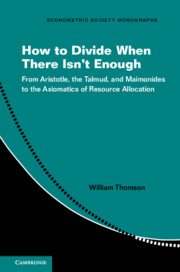Crossref Citations
This Book has been
cited by the following publications. This list is generated based on data provided by Crossref.
Thomson, William
2019.
The Future of Economic Design.
p.
213.
Bergantiños, Gustavo
and
Moreno-Ternero, Juan D.
2020.
Allocating extra revenues from broadcasting sports leagues.
Journal of Mathematical Economics,
Vol. 90,
Issue. ,
p.
65.
Stovall, John E.
2020.
Equal sacrifice taxation.
Games and Economic Behavior,
Vol. 121,
Issue. ,
p.
55.
Moreno-Ternero, Juan D.
Tsay, Min-Hung
and
Yeh, Chun-Hsien
2020.
A strategic justification of the Talmud rule based on lower and upper bounds.
International Journal of Game Theory,
Vol. 49,
Issue. 4,
p.
1045.
Mackenzie, Andrew
2020.
An axiomatic analysis of the papal conclave.
Economic Theory,
Vol. 69,
Issue. 3,
p.
713.
Flores-Szwagrzak, Karol
García-Segarra, Jaume
and
Ginés-Vilar, Miguel
2020.
Priority and proportionality in bankruptcy.
Social Choice and Welfare,
Vol. 54,
Issue. 4,
p.
559.
Giménez-Gómez, José-Manuel
Peris, Josep E.
Subiza, Begoña
and
Rosa Garcia, Alfonso
2020.
An egalitarian approach for sharing the cost of a spanning tree.
PLOS ONE,
Vol. 15,
Issue. 7,
p.
e0236058.
Mirás Calvo, Miguel Ángel
Quinteiro Sandomingo, Carmen
and
Sánchez-Rodríguez, Estela
2021.
Considerations on the aggregate monotonicity of the nucleolus and the core-center.
Mathematical Methods of Operations Research,
Vol. 93,
Issue. 2,
p.
291.
Chambers, Christopher P.
and
Moreno-Ternero, Juan D.
2021.
Bilateral redistribution.
Journal of Mathematical Economics,
Vol. 96,
Issue. ,
p.
102517.
Ertemel, Sinan
and
Kumar, Rajnish
2021.
Game Theory and Networks.
p.
177.
Estañ, Teresa
Llorca, Natividad
Martínez, Ricardo
and
Sánchez-Soriano, Joaquín
2021.
On the Difficulty of Budget Allocation in Claims Problems with Indivisible Items and Prices.
Group Decision and Negotiation,
Vol. 30,
Issue. 5,
p.
1133.
Hagiwara, Makoto
and
Hanato, Shunsuke
2021.
A strategic justification of the constrained equal awards rule through a procedurally fair multilateral bargaining game.
Theory and Decision,
Vol. 90,
Issue. 2,
p.
233.
Ju, Biung-Ghi
Kim, Min
Kim, Suyi
and
Moreno-Ternero, Juan D.
2021.
Fair international protocols for the abatement of GHG emissions.
Energy Economics,
Vol. 94,
Issue. ,
p.
105091.
Calvo, Emilio
2021.
Redistribution of tax resources: a cooperative game theory approach.
SERIEs,
Vol. 12,
Issue. 4,
p.
633.
Moretti, Stefano
and
Trabelsi, Raja
2021.
A Double-Weighted Bankruptcy Method to Allocate CO2 Emissions Permits.
Games,
Vol. 12,
Issue. 4,
p.
78.
Moreno-Ternero, Juan D.
2021.
William Thomson: “How to divide when there isn’t enough: from Aristotle, the Talmud and Maimonides to the axiomatics of resource allocation”.
Social Choice and Welfare,
Vol. 57,
Issue. 2,
p.
469.
Moreno-Ternero, Juan D.
and
Vidal-Puga, Juan
2021.
Aggregator operators for dynamic rationing.
European Journal of Operational Research,
Vol. 288,
Issue. 2,
p.
682.
Chun, Youngsub
and
Chambers, Christopher P.
2021.
Conversations on Social Choice and Welfare Theory - Vol. 1.
p.
279.
Wintein, Stefan
and
Heilmann, Conrad
2022.
Liberal political equality does not imply proportional representation.
Social Choice and Welfare,
Vol. 59,
Issue. 1,
p.
63.
Hussain, Akhtar
and
Musilek, Petr
2022.
Fairness and Utilitarianism in Allocating Energy to EVs During Power Contingencies Using Modified Division Rules.
IEEE Transactions on Sustainable Energy,
Vol. 13,
Issue. 3,
p.
1444.



